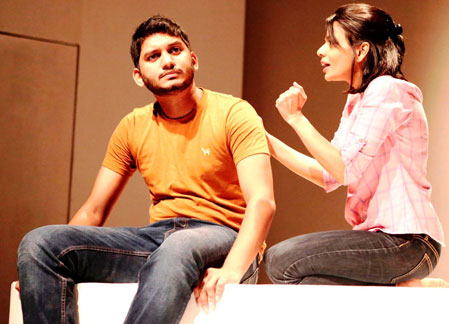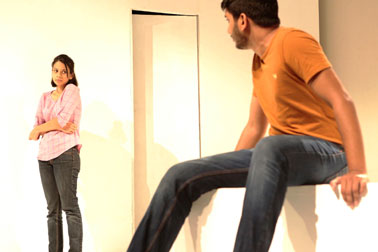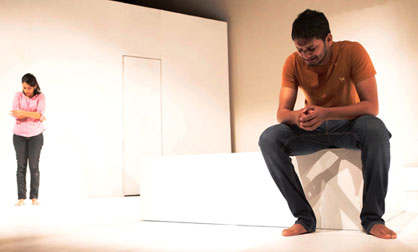|
 Why bring a child into a world that isn't full of sugar and spice
and all that's nice? Why bring a child into a world that isn't full of sugar and spice
and all that's nice?
by Dilshan Boange
Once upon a pleasant evening many years ago, my good friend Lakruwan
Withanage, who is now an accomplished professional in film and TV
commercial production field, related to me the plot of his Sinhala short
play Kadadhasi Boattoo (Paper Boats) which had been performed in the
State Drama Festival of 2004. At the heart of the play he narrated to
me, was a survey on how economic adversity creates a crippling emotional
dilemma on several people, whether or not they should become parents.
One young man in the play, Kadadhasi Boattoo, is afraid he will not be
able to fulfil his paternal obligations to his child from an economic
vantage. The desire for children also causes anxieties of how successful
first time parents would be in 'bringing up' a 'person' after
accomplishing the 'procreation' of a 'human'.
 Lungs, a British play written by Duncan Macmillan, and staged as a
directorial work by Sashane Perera at the Punchi Theatre, which I
watched on its closing night on June 26, showed a space where full
'ventilation' was made of the anxieties of a young couple at impending
parenthood, that begins a core question of whether they should have a
child and if it would prove to be a salutary decision? Lungs, a British play written by Duncan Macmillan, and staged as a
directorial work by Sashane Perera at the Punchi Theatre, which I
watched on its closing night on June 26, showed a space where full
'ventilation' was made of the anxieties of a young couple at impending
parenthood, that begins a core question of whether they should have a
child and if it would prove to be a salutary decision?
Produced by Dinesh Maheswaran Lungs was a Stage Light and Magic
Theatre Company presentation rated as an adults only show. As a work of
proscenium theatre it added newness in performance, style, genre, and
subject matter to Colombo's theatre scene of the day. The play consists
of two characters; a nameless young man and a nameless young woman
played respectively by Dino Corera and Tehani Chitty. Set in a
completely white, bare set that has only a rectangular box at the centre
as the only 'stage prop', and two doors on opposing sides for the
players to make their occasional exits to allow the other, complete
isolated moments onstage, the actors presented what was arguably an
arduous task, given the spectrum of emotions they had to portray/deliver
without the luxury of different players coming on stage at any point
offering respite by diverting the spotlight away from the principal
characters. Corera and Chitty, together with the director, Sashane
Perera deserve robust applause for the task they accomplished
commendably; and they most certainly were duly saluted that night by the
audience.
Celebrity status
He is a musician who hasn't reached super rich celebrity status yet,
and she is reading for a PhD and hopeful of having better employment
prospects after completing her doctorate. And between them is a notable
gap in intellectuality. It is one of the key grounds on which
insecurities breed and to an extent sets the status quo of the
psychological power play between them.
While watching Lungs I recalled a scene from Michael Ondaatje's novel
The English Patient where the character of the thief David Caravaggio
says to the Indian Kirpal Singh, with reference to Hana - "Could you
fall in love with her if she wasn't smarter than you? I mean, she may
not be smarter than you. But isn't it important for you to think she is
smarter than you in order to fall in love?"
Throughout the entire play there is no change of scenery except what
is inferred as a change of scene from the words and bodily nuances of
the players. Their costumes do not change either. There is no change to
their make-up to visually depict ageing. It is the dialogue, facial
expressions, and body movement that speak of the passage of time and
change of settings and progress of events.
 From discussing about the prospect of parenthood, to conceiving,
preparing for the impending parenthood, the miscarriage, the resultant
benumbing inertia and the consequent breakdown in the relationship, and
the turbulent path that paves the way for the eventual parenthood, and
the end of their 'journey' are all narrated as a theatricalised verbal
discourse between the two players whose physical interplay and dialogue
'depict' the change their inner selves go through, and thereby make
representation of the passage of time and events. It's marvellous how
sometimes a 'life' can be summed up through certain key moments being
captured in a line or two. Our world of potent emotions and compelling
events transcribed to language. From discussing about the prospect of parenthood, to conceiving,
preparing for the impending parenthood, the miscarriage, the resultant
benumbing inertia and the consequent breakdown in the relationship, and
the turbulent path that paves the way for the eventual parenthood, and
the end of their 'journey' are all narrated as a theatricalised verbal
discourse between the two players whose physical interplay and dialogue
'depict' the change their inner selves go through, and thereby make
representation of the passage of time and events. It's marvellous how
sometimes a 'life' can be summed up through certain key moments being
captured in a line or two. Our world of potent emotions and compelling
events transcribed to language.
The Buddha, in the Samyuththa Nikaya (Connected Discourses) says "In
this one-fathom long body with its perceptions and thoughts, do I
proclaim the world, the origin of the world, the cessation of the world
and the path leading to the cessation of the world." Seeing how without
the use of a single material implement, except for the clothing on their
bodies, the two actors narrated through their words and their bodies an
entire 'life' with its spectrum of anxieties, joys, sorrows, anger,
frustrations, expectations, hopes, fears, hypocrisies, it seems the
bodies of the players with all their capacities for (verbal and
nonverbal) expression served to create the characters' 'world'.
The nameless man and woman seem to stand as more than two specific
personae and able to represent symbolically predicaments faced by
different persons when faced with the prospect of parenthood, especially
if there is uncertainty and even insecurity underscoring their situation
in life and relationship as a whole.
Apart from the economics that affect when a couple decides to start a
family, a central concern of the couple is what sort of world is their
child going to be born into and be part of? Why bring a child into a
world that isn't full of sugar and spice and all that's nice? The world
at large as perceived by the couple is besieged by terrorism,
environmental destruction, and global warming and overall nastiness.
But! What if their child becomes that beam of sunshine that leads the
way for a revolution that clears all grey skies? The way in which
hypothetical scenarios are conceived and arbitrarily deduced and
calculated as probable outcomes by this couple in relation to issues
that affect the world as much as themselves, is astounding. The extremes
at which the two swing in their pessimism and idealism is astonishing,
amusing, and shows as a couple of armchair eco-warriors at the outset,
how their primary involvement is thinking, imagining and (rationally)
conjecturing about dealing with the future (of parenthood) rather than
dealing with it as they go on.
Emotional intelligence
Throughout the play one thing that struck me was that neither of them
shows much emotional intelligence; and emotionally charged spontaneity
seems to govern their lives despite the fact they seem to want to
rationally plan for what is optimally salutary. How much of the pressing
issues related to current global security actually gets calculated as
part of the concerns that beleaguer a couple when planning to have a
child? I believe it is reasonable to say, finding a Sri Lankan couple
who would be seriously concerned with anything other than financial
factors concerned with raising a child, would be a herculean task. In
this sense when looking at the multi layered dilemma the couple in Lungs
present, I wonder if all the massive concern about global security
issues spirals out of a need to suppress as much as possible their own
crippling insecurities of how doubtful they are about their capacity 'as
a couple' to be successful parents? How concerned are these theory buffs
in actuality about the ideals they assert humanity must live up to? When
one follows the text of the play it is no untruth that Lungs does speak
of the hypocrisy that lurks beneath the facade of contemporary western
society with its discourse of altruistic selfless ideals claimed for the
good of all humankind. What comes out after the miscarriage evinces how,
when emotionally embittered through what appears an irreparable loss,
bitter hate spews out without regrets, that shows little love for
humanity.
 On the aspect of stagecraft I felt the stark minimalism that was
presented, the 'pervasive bareness' surrounding the actors on stage may
even stand to signify in an abstract sense the 'barrenness' within the
two of them at the outset, who although are biologically fertile, are
somewhat infertile in conceiving a life of togetherness as a family in
the traditional sense within the formalised institution of marriage. On the aspect of stagecraft I felt the stark minimalism that was
presented, the 'pervasive bareness' surrounding the actors on stage may
even stand to signify in an abstract sense the 'barrenness' within the
two of them at the outset, who although are biologically fertile, are
somewhat infertile in conceiving a life of togetherness as a family in
the traditional sense within the formalised institution of marriage.
Although the woman was the wronged one, towards the second phase of
the development of their union, I couldn't help but see'toxicity' in the
woman's character from the early stages of the play. Her character was
brought to life in a way that made her seem the more emotionally needy
and volatile one.
I dare say there were attributes that made her seem something of a
'pseudo feminist' at times.
Towards the end, as the final line, 'I love you' is spoken, you do
realize that beneath it all were two characters who were on a trajectory
of events and emotions that say they are after all, human. You will
realize you have been in the grip of seeing their humanness at play. And
at that singular moment you cannot help but feel love for them.
|

